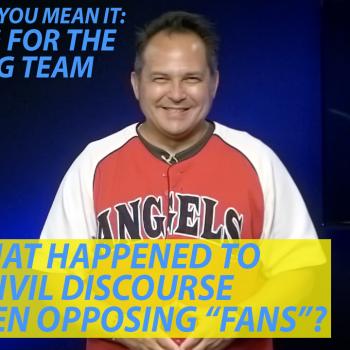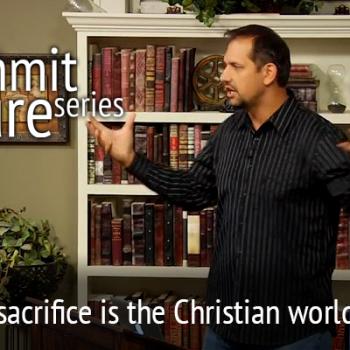
An article in the New York Times discusses “fake news” and how it relates to Evangelical Christianity
Are We in a Post-Truth Society?
KEVIN HARRIS: Dr. Craig, there is a New York Times article that has recently come out that has garnered a lot of response. From Molly Worthen. Dr. Worthen teaches at the University of North Carolina, Chapel Hill. She titles this article, “The Evangelical Roots of our Post-Truth Society.” She begins this:
The arrival of the “post-truth” political climate came as a shock to many Americans. But to the Christian writer Rachel Held Evans, charges of “fake news” are nothing new. “The deep distrust of the media, of scientific consensus — those were prevalent narratives growing up,” she told me.
First of all, this post-truth society – I’ve been hearing that that is now a phrase being coined because of all the “fake news” that is out there.
DR. WILLIAM LANE CRAIG: Right. When I saw this headline, I thought she was talking about some sort of post-modernism according to which there is no objective truth about the world – that there is only truth for me or truth for you. But according to the opening paragraph that is not what she means. She is just talking about distrust of the media and those who are typically held in positions of authority to tell us the political news. As you know, people denounce fake news. They come to distrust what the media says. That seems to be what she means by a post-truth political climate. It seems to me to be a mislabeling. It is more just a kind of deep suspiciousness of authorities, particularly news media outlets.
KEVIN HARRIS: There are whole books being published on how to spot fake news and how to tell whether something is true or false on social media. I guess it is becoming a problem. You see something on your Facebook page and everybody passes it around and forwards to you and so on, and you wonder if it is true. Sometimes it is not. Well, you just have – what? There is no easy answer to this. You have to do the hard work of digging into it and seeing if it is true.
DR. CRAIG:Yes, it seems to me that’s right.
KEVIN HARRIS:
Although Ms. Evans, 35, no longer calls herself an evangelical, she attended Bryan College, an evangelical school in Dayton, Tenn. She was taught to distrust information coming from the scientific or media elite because these sources did not hold a “biblical worldview.”
“It was presented as a cohesive worldview that you could maintain if you studied the Bible,” she told me. “Part of that was that climate change isn’t real, that evolution is a myth made up by scientists who hate God, and capitalism is God’s ideal for society.”
You see where she is going here – there is already been such a distrust of media elite and scientific elite among millions of evangelicals that – what? – that it could foster a post-truth type society?
DR. CRAIG:She doesn’t say that, though that is what the headline suggests. I think that would be way out of proportion with the size of the evangelical subculture to think that dissatisfaction with the media and fake news is the result of the evangelical subculture’s suspicion of the current scientific Darwinian paradigm in biology and things of that sort. But I think she is right in observing a phenomenon that within the evangelical subculture there is, I think, a deep suspicion and distrust of the sort of standard paradigm or scientific worldview that is conveyed to us.
KEVIN HARRIS: She says that this has provoked deep conflict among evangelicals themselves.
Conservative evangelicals are not the only ones who think that an authority trusted by the other side is probably lying. But they believe that their own authority — the inerrant Bible — is both supernatural and scientifically sound, and this conviction gives that natural human aversion to unwelcome facts a special power on the right. This religious tradition of fact denial long predates the rise of the culture wars, social media or President Trump, but it has provoked deep conflict among evangelicals themselves.
That innocuous phrase — “biblical worldview” or “Christian worldview” — is everywhere in the evangelical world. The radio show founded by Chuck Colson, “BreakPoint,” helps listeners “get informed and equipped to live out the Christian worldview.” Focus on the Family devotes a webpage to the implications of a worldview “based on the infallible Word of God.”
O.K. The phrase (a “biblical or Christian worldview”) whether it is true or not doesn’t seem to be the issue. It is not what is the true worldview.
DR. CRAIG:Except that she says it leads to fact denial which already begs the question that the biblical worldview is false and that the worldview against which it arranges itself is true. There is a kind of undercurrent throughout this whole article that these Christians are deluded. I even wonder whether she believes in worldview thinking at all. She seems to think of this almost as a kind of sinister phrase, but to think in terms of worldview is just to think of having a kind of philosophy of life, if you will – a world and life view. It would be to have a position on whether God exists, on the nature of human beings, do we have a soul? Are we just material entities? Is there life after death? Are there objective moral values and duties or is everything relative to one’s evolutionary and social conditioning? There are just all sorts of big questions in life that would go to make up a worldview. It seems to me that the encouragement of worldview thinking on the part of these various Christian ministries is a very positive thing. It is asking people not to live fragmented lives in which their faith is irrelevant to other parts of what they believe, but to have an overarching philosophy of life that will include the deliverances of the sciences, of literature, of history, psychology, the Bible, and all these other facets of knowledge. The idea of worldview thinking, I think, is very positive and indeed unavoidable. Those who emphasize the importance of worldview will often insist that those who claim not to have a worldview in fact really do but it will be a worldview of which they are unaware, one which they have just absorbed uncritically while studying, for example, at the university. These are the persons that are most in danger of being misled by their worldview in the way they interpret the facts.
KEVIN HARRIS: It is really pretty unavoidable isn’t it? Whether to have a worldview or to say, I don’t have a worldview. I’m a free-thinker . . . Isn’t this what the German theologians meant by Weltanschauung?
DR. CRAIG:Right! Yeah, when I was in college, that was the word that they used to encourage this type of synoptic thinking – to have aWeltanschauung, a way of looking at the world. A world and life view. As a Christian philosopher, it seems to me that this is what Socrates talked about when he said the unexamined life is not worth living. You ask the big questions in life and try to develop a framework or interpretation of reality that makes the best sense of the evidence.
KEVIN HARRIS: She has kind of given away her hand here by saying, There are facts and then there is the biblical worldview that can inoculate you from the facts.
DR. CRAIG:Yes, I think she is.
KEVIN HARRIS:It sets up a shield against mainstream science, politics, and all things secular and this bubble called a Christian worldview will keep the facts from you and you will live in it. Would you say a lot of question-begging going on here in a sense?
DR. CRAIG:It is question-begging insofar as she simply assumes the other worldview is correct. I noticed with interest on the last page of the article she says, “the worldview that has propelled mainstream Western intellectual life and made modern civilization possible is a kind of pragmatism.” She seems not to be saying that we should have no worldview but that we should have a worldview of pragmatism! That in itself needs to be critically examined and thought of. Pragmatism, classically, means that whatever works is true. So if it works then that makes it true. That is very scary when you think about it.Maybe national socialism might have worked very well in Germany, especially if they had won the war. But does that make it true? Does it make it acceptable? I tremble when I hear her saying, This is the worldview that has helped to make modern civilization possible – this sort of pragmatism. On the other hand, she goes on to describe it as an empirical outlook that revises its conclusion based on evidence. I don’t think that that is inimical to a biblical worldview. A biblical worldview should want to take account of what the deliverances of modern science are. When I read theologians, they will very typically say that in light of the deliverances of science one might need to change one’s interpretation of some biblical passage. They are quite open to revision in light of the evidence. But what they are skeptical about is unexamined assumptions. For example, the truth of naturalism that tends to undergird Darwinian theory. They will be skeptical of that, and they will want to demand good evidence in favor of it. I don’t see anything the matter with that.
KEVIN HARRIS: She says,
Ever since the scientific revolution, two compulsions have guided conservative Protestant intellectual life: the impulse to defend the Bible as a reliable scientific authority and the impulse to place the Bible beyond the claims of science entirely.
Do you see a conflict there?
DR. CRAIG:No, I don’t see any conflict. That is not to endorse these impulses, but I don’t see any conflict. She seems to be saying that within the evangelical subculture people wanted to treat the Bible as reliable on matters of science. The Bible is not just reliable when it speaks to matters of faith and theology and ethics, but whenever it touches on scientific matters it also is reliable. I think that is an assumption that has been widespread in the evangelical subculture. I think it is increasingly called into question today. I think a good many evangelicals today would say that the purpose of the Bible is not to serve as a scientific textbook and that it was written within the scientific understanding of the world as was the case when the authors wrote and that we shouldn’t turn to the Bible to find scientific information. But nevertheless, she is right. I think that this has been an assumption of the evangelical subculture. I think what she means by “the impulse to place the Bible beyond the claims of science” is you take the Bible to be authoritatively true and that it cannot be overthrown by scientific findings. You cannot falsify the Bible through scientific findings. What she doesn’t realize, though, is that evangelicals have shown a real openness to revise their interpretation of the Bible on the basis of scientific findings. They wouldn’t say the Bible has been falsified, but they might say,Well, it showed that my interpretation of the Bible was false, and I need to rethink what it really is teaching here. There can be openness to revision in light of scientific facts.
KEVIN HARRIS: I did notice that one of the respondents to The New York Times wrote that much of what she is talking about in evangelicalism is actually extinct – nobody holds to those.
DR. CRAIG:Oh, that is clearly false. Look at all the young Earth creationists.
KEVIN HARRIS: Which she brings up.
DR. CRAIG:Yeah, it seems to me that they very clearly hold the Bible to be a reliable scientific authority and that the Bible’s teachings about the creation of the world a few thousand years ago in six consecutive 24-hour days cannot be falsified by modern science. I don’t see where that person would come off saying that this view is extinct. This is very much alive today.
KEVIN HARRIS: She says,
The second impulse, the one that rejects scientists’ standing to challenge the Bible, evolved by the early 20th century into a school of thought called presuppositionalism.
DR. CRAIG:Yes.
KEVIN HARRIS: She says Cornelius Van Til . . . what, Bill? Most point to him as kind of like the main guy on presup?
DR. CRAIG:Yes, I think that would be fair to say.
KEVIN HARRIS: He said, “We really do not grant that you see any fact in any dimension of life truly,”
DR. CRAIG:That sentence is obviously taken out of context. We want to know what the context was. If we understand presuppositionalism, I think what Van Til would be saying there is that apart from Christian presuppositions we do not grant that you see any fact in life truly. It is only within the presuppositions of Christianity that facts can be truly and accurately seen. She would obviously disagree, I think, with Van Til.
KEVIN HARRIS: She goes to the Nazarene Church.
DR. CRAIG:Yeah, that is very interesting.
KEVIN HARRIS: She says that in their churches and in their universities there seems to be a kind of a conflict right now between mainstream . . . like the quote here, “how you can teach ‘Christian journalism’ any more than you can teach ‘Christian mathematics.’” There is not a Christian journalism any more than there is a Christian mathematics.
DR. CRAIG:This is sort of a repudiation of worldview thinking in a sense. I am more inclined to agree with Reformed thinkers that all knowledge needs to be seen within the context of a worldview and that being a Christian can make a difference even for mathematics. My work on God and abstract objects illustrates that so well, I think. How you view mathematical entities is going to depend upon your metaphysical worldview. For Christian journalism, it would seem to me obvious that your ethics on how you do journalism would be guided by whether or not you believe there are objective moral values and duties in carrying out your journalism. I am worried by what she reports. I have to say in my own experience I have been troubled by some of the things that I’ve heard said by professors in Nazarene colleges or universities. In my mind, I tend to associate the Church of the Nazarene with ultra-conservative – almost Mennonite – sort of subculture. No makeup. Very, very simple. But, honestly, when you look at what some of their professors are saying – and they quote some in this article – some of these folks have come to be detached, I think, from orthodox Christianity. This is, I think, one of the dangers of pietism and the holiness movement out of which the Church of the Nazarene springs – a downplaying of doctrinal accuracy and of the importance of doctrine in favor of considerations of lifestyle and experience. In Germany, pietism was followed by theological liberalism.
KEVIN HARRIS: Then she goes to the example of Answers in Genesis and one of the staff there who has a PhD in cell and developmental biology from Harvard, but goes on and uses this as an example of obviously saying that what Answers in Genesis teaches and believes is wrong and at odds but there is a protective bubble around them. They’ve learned to work by going to these secular institutions themselves.
DR. CRAIG:I found this part of the article to be bewildering, frankly. She is referring to Nathaniel Jeanson who is a research biologist with, as you say, a PhD in cell biology from Harvard. The man sounds eminently qualified, and yet he is a Creationist. She even gives an example in the article of where he revised his ideas about cancer based on the evidence. He gave up his old ideas. He said, “This is the way science works.” It caused him to revise his views. Then she says,
when his colleagues refuse to read his creationist papers and data sets, he takes their snub as proof that they can find no flaws in his research. “If people who devote their lives to it can’t point anything out, then I think I may be on to something,” he said.
I see nothing objectionable about that. If the man submits his creationist papers to colleagues and so forth and they can’t show him any errors in them, why shouldn’t he suspect that he may be on to something? She has such an attitude of condescension toward this man who sounds like a qualified cell biologist. I haven’t seen his papers, but why shouldn’t they be given an open-minded reading to see what he says?
KEVIN HARRIS: He says when his colleagues refuse to read – to even read – his papers and data sets that he takes that snub as, Well, that’s because you can’t answer.
DR. CRAIG:Let me just draw attention to one thing in the article that I found again odd. She says,
the worldview based on biblical inerrancy gets tangled up in the contradiction between its claims on universalist science and insistence on an exclusive faith.
What is the contradiction supposed to be? The contradiction is between “its claims on universalist science and insistence on an exclusive faith.” I don’t see the contradiction there. They think that on the basis of their biblical worldview they have the correct scientific view of the world, and they think that this is exclusively true and the views that disagree with this are wrong. That is what everybody thinks who holds to a particular view. Those who are Darwinian evolutionists think that non-Darwinian theories are false. Where is the contradiction? It is bewildering to me exactly what her point is.
KEVIN HARRIS: She said that we are all divided into tribes these days and you protect your tribes. Tribalism. I hear a lot of conservative talk show hosts talking about this – this problem of tribes. Wrong or right, I hang with my tribe, and your tribe insulates you from the truth or allegedly the truth.
DR. CRAIG:If that is her point, maybe this is her point – one ought to question one’s own assumptions and be ready to revise one’s worldview in light of countervailing evidence. I think that is fine. That is right. The same would be true for those who hold to a secular worldview – those who hold to a naturalistic worldview need to also be ready to examine their assumptions and presuppositions and revise when necessary based upon the evidence. I do think that there is objective evidence that can cause one to revise one’s worldview. I don’t buy into this sort of relativism that she says presuppositionalism is uncomfortably close to where your worldview is so all-determining that it insulates you against contrary evidence. It seems to me that that is simply false. Evidence can accumulate to such a degree that the anomalies in one’s worldview are so extreme that they can cause you to revise that worldview. That is true regardless of whether it is a theistic worldview or a secular worldview.
(This podcast is by Reasonable Faith / William Lane Craig. Discovered by Christian Podcast Central and our community — copyright is owned by the publisher, not Christian Podcast Central, and audio is streamed directly from their servers.)













